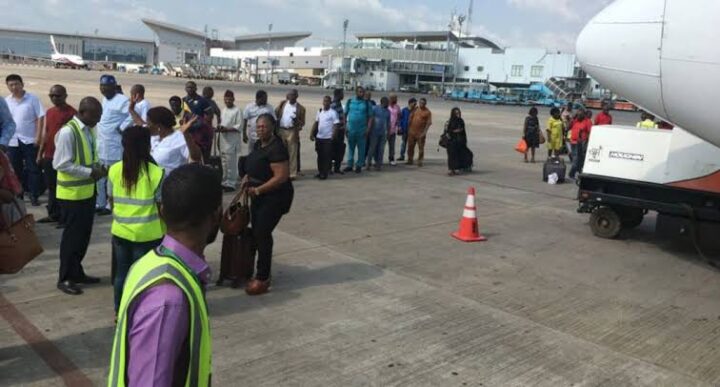Chairman of United Nigeria, Prof. Obiora Okonwo, made a thought-provoking statement, suggesting that a mere two percent of flight delays and cancellations should be attributed to airline operators. He contended that the remaining 98 percent of disruptions in air travel are primarily caused by factors outside the control of these carriers, such as weather conditions, inadequate infrastructure, and VIP movements throughout Nigeria.
This assertion came to light during an interaction with aviation journalists in Lagos. The occasion for this discussion was United Nigeria’s receipt of an International Air Transport Association (IATA) membership certificate. During the conversation, Okonwo expressed his regret that airlines are often unfairly criticized for flight delays and cancellations, despite having limited control over the root causes of these issues.
In Okonwo’s view, the predominant contributors to delays and cancellations within the Nigerian aviation industry are deficient infrastructure spanning the country’s 30-plus airports, adverse weather conditions, and the scheduling constraints imposed by VIP movements. According to him, no airline willingly disrupts its schedules, and their aircraft represent the most valuable assets when actively servicing passengers. The underutilization of aircraft across the country significantly disadvantages operators, leading to financial challenges and disruptions in the industry.

To provide context, Okonwo highlighted that aircraft are designed for optimal utilization, with the expectation of being in the air for up to 18 hours daily. However, most domestic aircraft in Nigeria currently operate for only seven to eight hours daily. This disparity results in an average monthly aircraft utilization rate of 200 to 250 hours in Nigeria, compared to 2,000 to 3,000 hours in more developed aviation nations. This stark contrast underscores the existing efficiency gaps within the Nigerian aviation sector.
Addressing the issues of delays and cancellations, Okonwo emphasized that a significant portion of these disruptions arises from adverse weather conditions. When adverse weather conditions prevail, it becomes impossible to land at airports due to the unavailability and lack of calibration of the Instrument Landing System (ILS) for necessary equipment. As a result, the airlines find themselves with limited options, and passenger inconvenience becomes inevitable. Okonwo expressed his hope that once the relevant authorities can provide the necessary infrastructure and create a conducive environment, these problems would naturally diminish.
In addition, Okonwo drew attention to the relatively small role of airline operators in causing delays and cancellations. Only two to three percent of delay factors can reasonably be attributed to the operators themselves. He underscored the business perspective, explaining that airlines can only generate revenue when their aircraft are in operation, as grounded planes still incur expenses, maintenance costs, and leasing fees. The airlines’ profits are directly linked to ticket sales, and they only start making money when passengers use the tickets. In essence, airlines benefit the most when flights operate on time, ensuring customers reach their intended destinations. According to Okonwo, the root of the problem doesn’t lie in the quantity of aircraft but rather in the broader industry factors.
Regarding the policy of requiring a minimum of six aircraft for operators, Okonwo found it to be unnecessary and argued that individual airlines should determine their fleet size based on their business models. He provided examples of renowned airlines like Emirates and Ethiopian Airlines, which initially operated with just two aircraft and gradually expanded their fleets to include hundreds of planes. Okonwo firmly believed that the Nigerian Civil Aviation Authority (NCAA) should place more emphasis on enhancing safety measures and addressing the infrastructure deficits in most airports. He stressed that the number of airplanes in an airline’s fleet does not serve as the primary determinant of flight delays or cancellations.
In conclusion, Okonwo commended the NCAA for its effective oversight role in maintaining safety within the aviation industry. He expressed satisfaction with the organization’s efforts, noting that these initiatives have played a significant role in improving safety standards in the sector. Furthermore, he acknowledged that the minimum requirement of three aircraft for startup operators, as mandated by the NCAA, is a positive step forward for the industry.
Support InfoStride News' Credible Journalism: Only credible journalism can guarantee a fair, accountable and transparent society, including democracy and government. It involves a lot of efforts and money. We need your support. Click here to Donate
